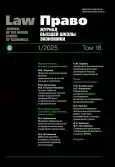卷 18, 编号 1 (2025)
Legal Thought: History and Modernity
Law as a Socio-cultural Phenomenon: Harmonization on Basis of the Principle of Humanism
摘要
 4-26
4-26


Genesis of Term “Private International Law” in the Russian Doctrine of the 19th Century: from Legal Heritage to Modernity
摘要
 27-57
27-57


Russian Law: Condition, Perspectives, Commentaries
Legal Design of Economic Relations for Property Management
摘要
 58-84
58-84


Differentia specifica of Legal Principles in Context of Judicial Reasoning
摘要
 85-114
85-114


Making Gratuitous Business Contracts in Russia: Limits of Permissibility
摘要
 115-139
115-139


The Consistency of Evidence as a Condition for Sentencing in a Special Order of the Trial
摘要
 140-164
140-164


Law in the Modern World
Splitting of Contractual Statute In Standard Master Agreements in the Over-the-Counter Derivatives Market
摘要
 165-190
165-190


Decentralized Autonomous Organizations (DAOs): Challenges of Qualification and Choice of a Law Applicable
摘要
 191-216
191-216


Determining the Applicable Law to Copyright Ownership: National Treatment Principle in Tension with Legacy Copyright Treaties
摘要
The present article examines a potential conflict between the national treatment principle, which is enshrined in most significant multilateral copyright treaties, on the one hand, and legacy copyright treaties — primarily bilateral ones, but also certain multilateral treaties such as the Montevideo Convention — containing conflict-of-laws rules not fully compatible with the national treatment principle, on the other. The analysis places special focus on the conflict-of-laws issue of copyright ownership. While the national treatment principle is often interpreted as mandating the application of lex loci protectionis, some legacy copyright treaties prescribe the application of lex originis or use other connecting factors for determining the law applicable to copyright ownership. The paper analyzes how such conflicts are to be resolved, focusing particularly on the interpretation of Article 20 of the Berne Convention. Through examination of case law and scholarly views, it is argued that Article 20 allows for the application of particular provisions of legacy copyright treaties on the condition that their application implies granting authors/right holders in the particular case more extensive rights, even if these provisions contradict the national treatment principle, which is one of the fundamental principles of the Berne Convention and, in general, of modern international copyright law. It is concluded that courts must assess the applicability of provisions contained in specific international treaties on a case-by-case basis, striving to reconcile competing provisions where feasible, in line with the principle of systemic interpretation inherent in international law. Overall, the analysis reveals that the applicability of conflict-of-laws rules contained in legacy copyright treaties, which might be non-compliant with the national treatment principle, is, under certain conditions, not excluded, even when the Berne Convention is on the particular case generally applicable. The complex relationship between sources of particular international law requires a nuanced approach to resolving potential conflicts between them.
 217-246
217-246


Legal regulation of platform employment in BRICS
摘要
 247–279
247–279


Review
Wage Security in Hybrid Legal Regimes
摘要
 280-296
280-296










